外研版七年级英语下册第七模块重点句子
七年级英语下册Module7MypastlifeUnit3Languageinuse教案新版外研版

Unit 3 Language in use课题Module 7 My past life 第三课时Unit 3 Language in use 课型Revision教学目标知识目标1.复习并掌握以下词汇:yesterday, born, strict, friendly, primary school, town, US,village, nice, good, difficult, bathroom, bedroom, garden...2.掌握以下句型:①I was born in Quincy.② My first teacher was Mrs Lane.③I wasn’t born in Quincy.④—Were you difficult in class too?—No, I wasn’t.⑤Where were you born?能力目标能够用动词be的过去式描述自己和他人过去的生活或经历情感目标通过对过去童年或家乡的描述,产生对家乡和美好生活的热爱教学重点1.Grasp the words and the expressions in this module2.Grasp how to describe one’s own and others’ past life教学难点1.Grasp the past tense form of the irregular verbs2.Describe one’s own and other’s past life课前预习Preview the new words教学方法Situational approach; Listening and speaking approach;Communicative approach教学过程教学环节教师活动学生活动备课札记Step 1 Revision and lead in Show students theseimportant sentences:I was born in Quincy.Look through theseimportant sentences andunderstand the use of be让学生们首先通过语境复习本模块所学重点语法:一般过去时My first teacher was MrsLane.I wasn’t born in Quincy.—Were you difficult inclass too?—No, I wasn’t.Where were you born?(was/were).Step 2 Grammar Let students go over thegrammar.一般过去时一、一般过去通常用于表达过去发生的事情。
初中英语外研版(2012)七年级下册Module7知识点默写(含答案)
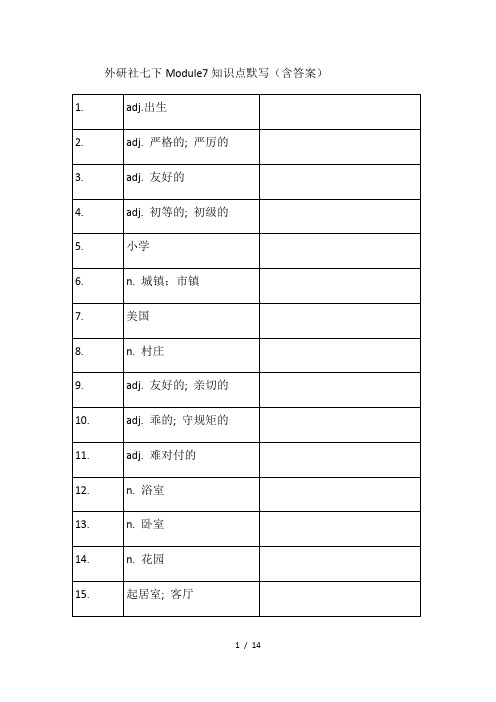
in the village/country
7.在城镇
in town
在一个小城镇
in a small town
8.非常难管
quite difficult
9.在东部
in the east of
10.在海岸线上
on the coast of
11.在美国东海岸
on the east coast of America /the US
27.昨天那有一部新电影上映。
参考答案
1.
adj.出生
born [bɔːn](动词bear的过去分词)
2.
adj.严格的;严厉的
strict [strɪkt]
3.
adj.友好的
friendly['fren(d)lɪ]
4.
adj.初等的;初级的
primary ['praɪm(ə)rɪ]
5.
小学
primary school
18.我在那里非常快乐。
I was very happy there.
19.那儿有一间大的起居室,里面有一台电视机,还有一间厨房,一个卫生间和三间卧室。
There was a big living room with a TV, a kitchen, a bathroom and three bedrooms.
6.
n.城镇;市镇
town[taʊn]
7.
美国
US
8.
n.村庄
village['vɪlɪdʒ]
9.
adj.友好的;亲切的
nice [naɪs]
10.
adj.乖的;守规矩的
good [gʊd]
外研版七年级英语下册各模块语法知识汇总+专项练习

外研版七年级英语下册各模块语法知识汇总+专项练习M1 形容词性和名词性物主代词专项练物主代词分为两种:形容词性物主代词和名词性物主代词。
形容词性物主代词不能单独使用,后面必须跟名词,例如:We are doing our XXX(我们正在做家庭作业。
)名词性物主代词则具有名词的性质,可以单独使用,例如:My shirt is black。
but yours is white.(我的衬衫是黑色的,但你的是白色的。
)名词性物主代词也可以具有“形容词性物主代词+名词”的作用,例如:Whose comb is it。
It’s hers.(hers=her+comb)下面是物主代词的对照表:物主代词 | 形容词性 | 名词性 |我的 | my | XXX |你的 | your | yours |他的 | his | his |她的 | her | hers |它的 | its | its |我们的 | our | ours |你们的 | your | yours |他们的 | their | theirs |需要注意的是,名词性物主代词可指一件东西,也可指很多件东西,需要根据上下文来决定。
例如:选择填空:1.This is my teapot。
It’s not __________。
(your/ yours)2.My hairdryer is on the desk。
Where’s ____________?(her/ hers)3.___________ hairdryer is not on the table。
___________ is there。
(Her/ Mine)4.Whose calculator is it?It’s __________。
It’s __________ XXX)5.Are they ___________ (your/ yours) combs。
Yes。
they’re _________(our/ ours).用所给词的适当形式填空:1.That is not _________ kite。
外研版七年级英语下册 Module 6-7模块知识点归纳
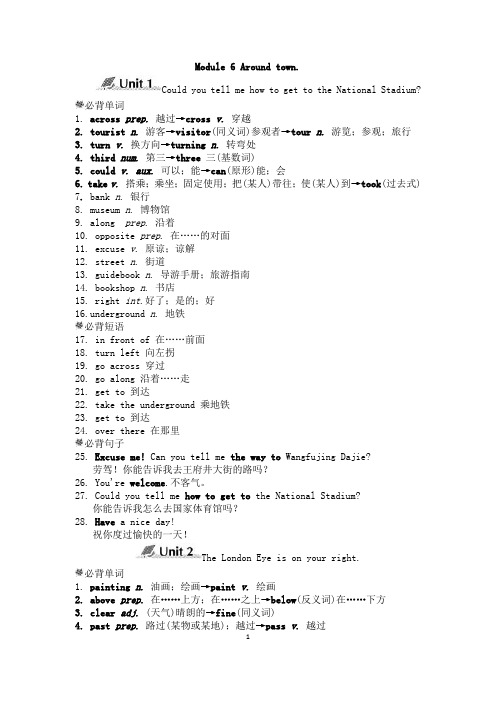
Module 6 Around town.Could you tell me how to get to the National Stadium? 必背单词1. across prep.越过→cross v.穿越2. tourist n. 游客→visitor(同义词)参观者→tour n.游览;参观;旅行3. turn v.换方向→turning n. 转弯处4. third num.第三→three 三(基数词)5. could v. aux.可以;能→can(原形)能;会6. take v.搭乘;乘坐;固定使用;把(某人)带往;使(某人)到→took(过去式)7. bank n. 银行8. museum n. 博物馆9. along prep. 沿着10. opposite prep. 在……的对面11. excuse v. 原谅;谅解12. street n. 街道13. guidebook n. 导游手册;旅游指南14. bookshop n. 书店15. right int.好了;是的;好16.underground n. 地铁必背短语17. in front of 在……前面18. turn left 向左拐19. go across 穿过20. go along 沿着……走21. get to 到达22. take the underground 乘地铁23. get to 到达24. over there 在那里必背句子25. Excuse me! Can you tell me the way to Wangfujing Dajie?劳驾!你能告诉我去王府井大街的路吗?26. You're welcome.不客气。
27. Could you tell me how to get to the National Stadium?你能告诉我怎么去国家体育馆吗?28. Have a nice day!祝你度过愉快的一天!The London Eye is on your right.必背单词1. painting n.油画;绘画→paint v.绘画2. above prep.在……上方;在……之上→below(反义词)在……下方3. clear adj. (天气)晴朗的→fine(同义词)4. past prep.路过(某物或某地);越过→pass v.越过5. church n.教堂→churches pl.6. finish v.结束;完成→finishes(第三人称单数)7. high adj.高的→low(反义词)→height n.高度8. square n. 广场9. middle n. 中部;中间adj. 中等的,中部的10. famous adj. 著名的11. from prep. 从……出发12. metre n. 米13. river n. 河,江14. bridge n. 桥15. railway n. 铁路必背短语16. the middle of ……的中间17. on a clear day 在晴朗的一天18. next to 紧挨着19. most of ……中的大部分20. get off 下车21. go past 经过;走过必背句子22. Welcome to this short tour of London.欢迎踏上这次短暂的伦敦之旅。
外研版初中英语句子翻译复习(外研版)初一下册

初中一年级下册 2013.5.23
第一模块:人物和地点
• 1. 我们正玩得很开心。 2. 其他人正在做什么? 3. 托尼正在吃冰激凌。 4. 他正在拍摄大量照片。 5. 她在买一些礼物。 6. 他正躺在阳光下吃午饭。 7. 此刻,在世界不同的地方人们正在做着不同的事情。 8. 他们正在等公共汽车和赶火车。 9. 一些人正在家里喝下午茶或者正走向酒吧要喝一杯。 10. 人们没在起床、洗漱或者穿衣服。
第三模块:计划
• 26. 周末你打算做什么? 27. 在星期六晚上,我打算参加朋友家里的一个 聚会。 28. 晚上,我打算复习考试。 29. 我正盼望着见到我的女儿。 30. 我们将去观光游览因为我喜欢中国文化。 31. 我们将去参观故宫,然后我们去爬长城。 32. 我打算学英语因为我想交几个美国朋友。 33. 我的妻子和我将躺在沙滩上因为我的孩子们 喜欢游泳。 34. 他们将横渡太平洋和大西洋。 35. (天气)将多风。
Module 1 People and places
• 1. We’re having a great time. 2. What are the others doing? 3. Tony is eating an ice-cream. 4. He is taking lots of pictures. 5. She is buying some presents. 6. He is eating lunch and lying in the sun. 7. At this moment, in different places of the world people are doing different things. 8. They are waiting for buses and running for trains. 9. Some are having afternoon tea at home or walking to pubs and having a drink. 10. People aren’t getting up, washing or getting dressed.
外研版英语七年级下册重点短语打印版

七(下)重点短语Module 1.People and Places1.为某人买某物buy sb sth=buy sth for sb2. 等待wait for3.在学校旅行(be) on a school trip4.长城the Great Wall5.与某人交谈talk to sb6.玩的很开心have a good/great time7.吃冰淇淋eat an ice cream8.拍照take photos=take pictures9.躺在阳光下lie in the sun10.吃午餐eat lunch=have lunch11.给某人某物send sb sth = send sth to sb12.非常享受enjoy ….a lot =enjoy …very much13.此刻at the/this moment14.做不同的事情do different things15.喝下午茶have afternoon tea16喝一杯have a drink17.去剧院go to the opera18.看芭蕾舞表演watch a ballet19看电视watch television20.玩电脑游戏play computer games21穿衣服get dressed22.打电话回家call home23.拜访朋友see friends=visit friends24.谢谢某人做某事thank sb for sth/doing….25.在。
之前in front of /in the front of26.写信给。
write …to …27再见see you soon = see you later28享受(喜欢)做某事enjoy doing sth29 沿。
走walk upModule 2 Spring Festival1.打扫房间clean the house2.煮饭cool the meal3. 学舞龙learn a dragon dance4.做灯笼make lanterns =make a lantern5.扫地sweep the floor6.为。
外研版七年级下册Module 7重点内容复习总结

外研版七年级下册module 7重点内容总结【语法】一般过去时表示过去某一时间发生的动作或存在的状态、过去的特征、过去的行为等。
和一般过去时连用的时间状语有:last...\yesterday\....ago\in the past\the other day\at that time\just now\in+过去的年份等。
如:I was born in 2000.He went to the museum yesterday.We climbed the mountain last week.be动词的一般过去时(1)概念:一般过去时表示过去某个时间里发生的动作、状态或是过去习惯性、经常性的动作、行为。
(2)be动词的一般过去时的基本结构①肯定句:主语+was/were+其他。
②否定句:主语+was/were+not+其他。
③一般疑问句:Were/Was+主语+其他?(3)be动词的过去式,如下表:带有was或were的句子,其肯定、否定、疑问和回答方式变化如下:【重点词汇】with 带有;具有There was a big living room with a TV.这儿有一间带电视的大起居室。
上面例句中的with a TV是介词短语,在句中作定语,修饰a big living room。
with意为“带有;具有”。
如:I have a house with a swimming pool.我有一所带游泳池的房子。
The Blacks own a pretty big house with a garden.布朗克一家拥有一个带有花园的大房子。
Our teachers is a woman with brown eyes.我们的老师是一位有着褐色眼睛的女士。
strict 严格的;严厉的strict作形容词,意为“严格的;严厉的”,在句中既可以作表语,也可以作定语。
如:①My mother is always very strict.我的妈妈总是很严格。
外研版英语(新标准)七年级下册模块知识点归纳总结(全册)
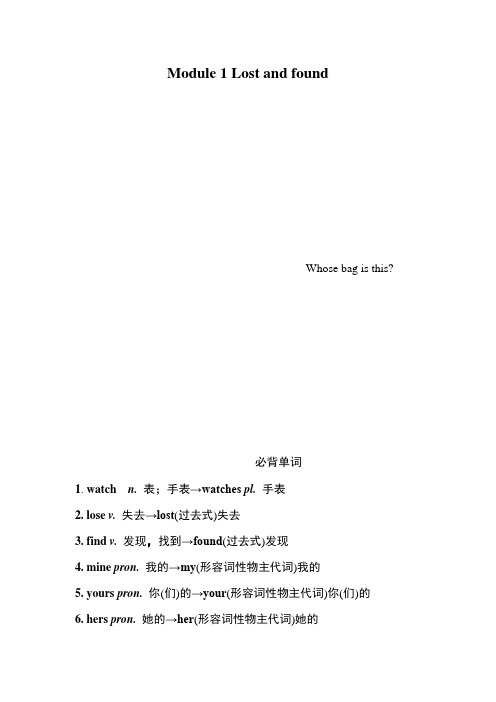
Module 1 Lost and foundWhose bag is this?必背单词1. watch n.表;手表→watches pl.手表2. lose v.失去→lost(过去式)失去3. find v.发现,找到→found(过去式)发现4. mine pron.我的→my(形容词性物主代词)我的5. yours pron.你(们)的→your(形容词性物主代词)你(们)的6. hers pron.她的→her(形容词性物主代词)她的7. careful adj.仔细的;认真的;小心的→carefully adv.仔细地;认真地;小心地8. crayon n. 蜡笔9. eraser n. 橡皮擦10. glove n. 手套11. wallet n. 钱包12. whose pron. 谁的13. tape n. 录音带;录像带14. purple adj. 紫色的;紫红色的;n. 紫色;紫红色必背短语15. first of all 首先,第一16. look at 看17. be careful with 小心(对待)……18. from now on 从现在开始19. a lot of 许多,大量20. lost and found box 失物招领箱必背句子21. Welcome back to school, everyone!欢迎大家返校!22. Whose bag is this?这是谁的书包?23. Here's a purple wallet!这里有一个紫色的钱包!24. Let me see...让我看看……Are they yours?必背单词1. leave v.丢下;遗忘→left(过去式)丢下;遗忘2. strange adj.奇怪的→stranger n.陌生人3. camera n. 照相机4. phone n. 电话;电话机5. plane n. 飞机6. taxi n. 出租车7. why adv. 为什么8. airport n. 机场;航空港9. hundred num. 百10. thousand num. 千11. boat n. 船12. duck n. 鸭13. pig n. 猪14. sausage n. 香肠;腊肠必背短语15. mobile phone 移动电话;手机16. lost and found office 失物招领处17. in a hurry 匆匆忙忙18. hundreds of 几百;成百上千19. look for 寻找20. at the moment 目前;此时必背句子21. Welcome to the New York City Lost and found office.欢迎来到纽约市的失物招领处。
外研版七年级英语下册模块7知识点归纳
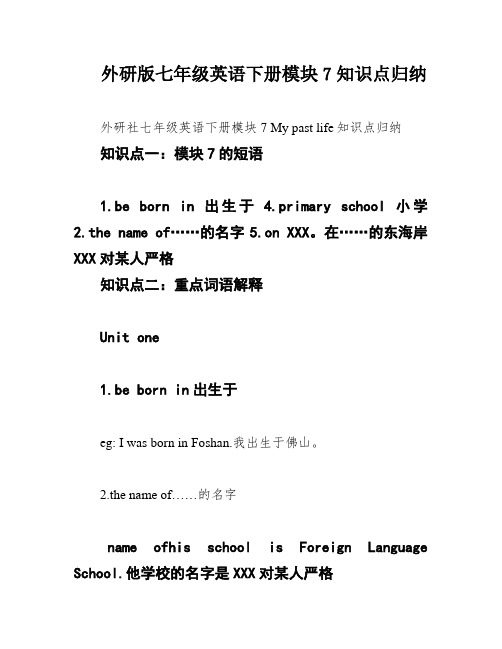
外研版七年级英语下册模块7知识点归纳外研社七年级英语下册模块7 My past life知识点归纳知识点一:模块7的短语1.be born in出生于 4.primary school小学2.the name of……的名字5.on XXX。
在……的东海岸XXX对某人严格知识点二:重点词语解释Unit one1.be born in出生于eg: I was born in Foshan.我出生于佛山。
2.the name of……的名字name ofhis school is Foreign Language School.他学校的名字是XXX对某人严格e.g。
Our XXX老师对我们要求很严格XXXe.g。
The children like their primary school very much.孩子们非常喜欢他们的小学。
be动词的形式amisare原形aren’t否定缩略式am notisn’twaswaswere过去式否认缩略式wasn’XXX’XXX’tUnit two1.eastadj.东面的,东部的n.东方eg:XXX China.上海在中国东海岸上。
XXX常构成的短语有:XXX。
在……的东海岸in the east of。
在……(规模内)的东面to the east of。
在……(范围外)的东面eg:China XXX.中国位于亚洲的东部。
2.agoadv.以前eg:XXX.我们两周前开过一次会。
辨析ago与beforeagobeforeMy father went to Shanghai two daysago.我爸爸两天前去了上海。
“在某具体时间之前”;“在做某事XXX.之前”你必须在午饭前做完作业。
“时间段+ago”,用于一般过去时3.bored adj.厌烦的,厌倦的eg:How can you bebored?你怎么会厌倦呢?辨析bored与boringXXX讨厌的,用于透露表现人Little XXX at home alone and he XXX.的情绪等小XXX单独由家,他感触讨厌。
外研版七年级英语下Module_7知识点总结
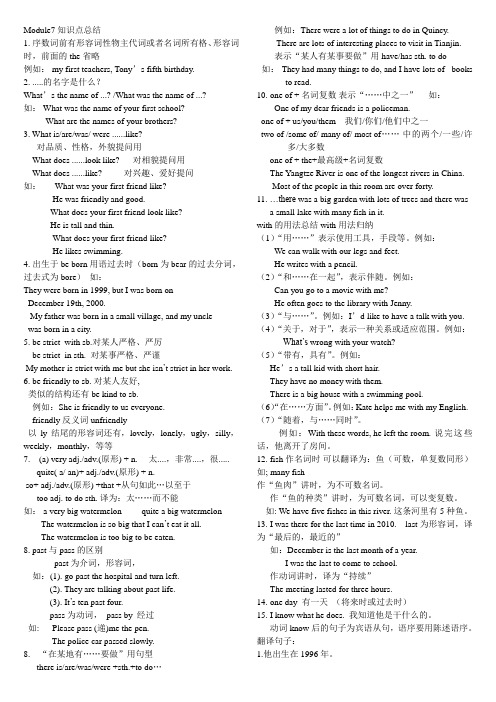
Module7 知识点总结1. 序数词前有形容词性物主代词或者名词所有格、形容词时,前面的the省略例如: my first teachers, Tony’s fifth birthday.2. .....的名字是什么?What’s the name of ...? /What was the name of ...?如: What was the name of your first school?What are the names of your brothers?3. What is/are/was/ were ......like?对品质、性格,外貌提问用What does ......look like? 对相貌提问用What does ......like? 对兴趣、爱好提问如: ----What was your first friend like?----He was friendly and good.----What does your first friend look like?----He is tall and thin.----What does your first friend like?----He likes swimming.4. 出生于be born用语过去时(born为bear的过去分词,过去式为bore)如:They were born in 1999, but I was born onDecember 19th, 2000.My father was born in a small village, and my unclewas born in a city.5. be strict with sb.对某人严格、严厉be strict in sth. 对某事严格、严谨My mother is strict with me but she isn’t strict in her work.6. be friendly to sb. 对某人友好,类似的结构还有be kind to sb.例如:She is friendly to us everyone.friendly 反义词 unfriendly以ly结尾的形容词还有,lovely,lonely,ugly,silly,weekly,monthly,等等7.(a) very adj./adv.(原形) + n. 太....,非常....,很.....quite( a/ an)+ adj./adv.(原形) + n.so+ adj./adv.(原形) +that +从句如此…以至于too adj. to do sth. 译为:太……而不能如: a very big watermelon quite a big watermelonThe watermelon is so big that I can’t eat it all.The watermelon is too big to be eaten.8. past 与pass的区别past 为介词,形容词,如:(1). go past the hospital and turn left.(2). They are talking about past life.(3). It’s ten past four.pass为动词,pass by 经过如: Please pass (递)me the pen.The police car passed slowly.8.“在某地有……要做”用句型there is/are/was/were +sth.+to do…例如:There were a lot of things to do in Quincy.There are lots of interesting places to visit in Tianjin.表示“某人有某事要做”用have/has sth. to do如: They had many things to do, and I have lots of books to read.10. one of + 名词复数表示“……中之一”如:One of my dear friends is a policeman.one of + us/you/them 我们/你们/他们中之一two of /some of/ many of/ most of……中的两个/一些/许多/大多数one of + the+最高级+名词复数The Yangtze River is one of the longest rivers in China.Most of the people in this room are over forty.11. …there was a big garden with lots of trees and there wasa small lake with many fish in it.with 的用法总结 with用法归纳(1)“用……”表示使用工具,手段等。
7-7Module7单元知识小结七年级英语下册同步精品课堂(外研版)

外研版七年级下册Module 7单元知识小结◆◆知识点1 be born at / on /in 出生在什么时间?用哪个介词,取决于介词的用法Eg : I was born at 7 o’clock 1st July ,1990 .I was born on 1st ,1990 .I was born in 1990 .注意如果后面既有时间状语,又有地点状语,先时间状语,再地点状语。
I was born in 1st July 1990 in Wenzhou .2 what +be +sb +like? 某人性格怎么样3 it is /was +adj / n (for of sb )+to do sth (对某人来说)做某事是adj / nof for 取决于adj 是否是修饰人的形容词。
Eg : It is easy for me to learn English .It is friendly of you to help me .It is a good idea for my mother to go shopping .It is interesting to play computer games .4 hero(es)tomatoes potatoes 英雄爱吃土豆,西红柿。
初中阶段以o结尾的名词,除这三个,其它均加s eg: photos5 be strict with sb 对某人严格be strict in sth 对某事严格Eg :Our teachers are strict with us .Our teachers are strict in our schoolwork .6 there be +名词to do sth to do sth 作后置定语修饰名词Eg : There are a lot of places of famous to visit in Wenzhou .there be +n + doing sth 某某正在做某事Eg : There is a boy playing computer games .7 with 的用法既要做连词,又可做介词1 和某某一起eg : I go to school with my mother every day .2 表伴随,“有,带有”eg : There is a big school with a garden .。
外研版七年级英语下册课文重点词句翻译汉译英

外研版七年级英语下册课文重点词句翻译汉译英Module 11.从现在开始要小心你们的东西。
2.人们经常在匆匆忙忙中遗失东西。
3.这就是为什么在机场和车站设有失物招领箱。
4.寻找他们的手机5.很多其他的东西6.2千个手机Module 21.参加音乐俱乐部2.我跟每个人都能很好相处。
3.我学习好。
4.我总是乐于帮助他人。
5.我承诺会帮你。
6.我擅长踢足球。
Module 31. 看电影2. 还有谁会在那里?3. 她不能与我们一起来。
4. 野餐5. 一个人待家里6. 这将会是一个美妙的周末。
7. 我期待明天的足球比赛。
8. 我会跟我家人和朋友出门9. 参加夏令营Module 41.他们将会有很多空闲时光。
2.未来生活会变怎么样呢?3.海平面会升高。
4.我们不再乘车或汽车去旅游。
5.交通拥堵Module 51.我可以试穿一下吗?2.这个太多了。
3.今天有打折。
4.网购有不少优点。
5.你可以随时随地买东西。
6.比较同类产品的价格7.网购正在改变我们的生活方式。
Module 61.穿过人民路,沿着那条街道,在第三条街的左边左转。
2.在银行对面3.你会看到一个地铁站。
4.乘地铁5.国会大厦6.下船7.你现在回到广场了。
8.沿着Green街走去,经过银行Module 71.我出生在一个小村庄。
2.我不无聊。
3.我很期待再次见到我的朋友们。
Module 81.散步2.她迷路了。
3.匆忙朝房子去4.敲门5.很久以前6.椅子破碎了。
7.不久她就在床上睡着了。
8.指着小女孩9.跳下床Module 91.在12岁开始工作2.他觉得成为一个演员。
3.他在1582年结婚。
4.加入一家喜剧公司5.他全球闻名。
Module 101.开车带我们去他们家2.前天3.世界闻名的艺术作品4.给你买了一个礼物5.排队等了一个小时6.我们等到华灯初上。
Module 111.握手2.点头3.拥抱彼此4.十指合拢5.新的外国学生6.给他们更多私人空间7.中国女孩经常和他们的朋友手挽着手走路。
七年级英语下册 Module 7 My past life曼德拉十大经典语录文章素材 (新版)外研版

曼德拉十大经典语录●“当我走出囚室迈向通往自由的监狱大门时,我已经清楚,自己若不能把痛苦与怨恨留在身后,那么其实我仍在狱中”。
●“让黑人和白人成为兄弟,南非才能繁荣发展。
”●“在那漫长而孤独的岁月中,我对自己的人民获得自由的渴望变成了一种对所有人,包括白人和黑人,都获得自由的渴望。
”——曼德拉对战争与和平拥有独特的认识。
●“压迫者和被压迫者一样需要获得解放。
夺走别人自由的人是仇恨的囚徒,他被偏见和短视的铁栅囚禁着。
”●“我已经把我的一生奉献给了非洲人民的斗争,我为反对白人种族统治进行斗争,我也为反对黑人专制而斗争。
我怀有一个建立民主和自由社会的美好理想,在这样的社会里,所有人都和睦相处,有着平等的机会。
我希望为这一理想而活着,并去实现它。
但如果需要的话,我也准备为它献出生命。
”——1964年被判终身监禁时,曼德拉将审讯法庭变成了揭露种族隔离制度罪恶和唤醒广大民众的讲坛。
他那长达4个小时的声明是这样结束的。
●“在这次伊拉克战争中,我们看见了美国和布什的一举一动,到底谁是世界的威胁?!”——曼德拉谴责美国总统布什肆意践踏伊拉克主权。
●“你(克林顿)如果不高兴就跳进游泳池去吧!”——曼德拉最不喜欢别人对南非指手画脚,1998年3月克林顿访问南非,在联合记者招待会上,曼德拉公开表示南非将与古巴、伊朗、利比亚保持密切关系,并宣布不久将出访伊朗,令与其并肩站在一起的克林顿大为尴尬。
●“我已经演完了我的角色,现在只求默默无闻地生活。
我想回到故乡的村寨,在童年时嬉戏玩耍的山坡上漫步。
”——退休后的曼德拉甘愿做一个平民。
●“我想用乐观的色彩来画下那个岛,这也是我想与全世界人民分享的。
我想告诉大家,只要我们能接受生命中的挑战,连最奇异的梦想都可实现!”曼德拉84岁时曾在南非举办了个人画展,作品主题是监狱生活。
在27年的铁窗生活中,曼德拉用木炭和蜡笔绘画来打发时间,渐渐形成了独特画风:线条简单、色彩丰富。
他最喜欢用画笔讲述自己的铁窗故事,但并不选用“黑暗、阴沉”的颜色,而是明亮轻快的色彩,以此来表现自己乐观积极的心态。
中考英语 七年级下册 第四讲 Modules7-12复习课件(含11真题) 外研版

on与时间连用时,常与具体的一天或具体某一天的上午、下午、晚上 连用。
It happened on Monday morning. 这件事发生在星期一上午。 【辨析】 at,on与in 三者都是表示时间的介词。 ①at多用于具体的钟点时刻前。 I usually get up at 5:30.我通常在5:30起床。 ②on主要用在星期几,具体的某一天或具体一天的上午、下午、晚上 或节日前。
11.look around 向四周看
12.again and again 再三;反复……
13.go away 走开,离开
14.at the age of 在……岁时
重 点 句 型 整 理
1.She was very friendly. 2.He was born on 18th July,1918. 3.At twentyeight he moved to London and joined a theatre company. 4.How long did you spend there?
I paid 20 yuan for the book.
我买这本书花了二十元钱。
The pen cost me 10 yuan.
这支钢笔花了我十元钱。
Hale Waihona Puke 七年级(下) Modules 7~12 (训练时间:60分钟 分值:100分)
基础知识过关 一、根据首字母及汉语意思写出下列单词(8分) 1.My father is always s____t_r_i_c_t_____with me. 2.The boys were too naughty, they d__e_s_t_r_o_y_e_d_____the teacher's desk and made the teacher very unhappy. 3.In 1994, Mary m__a_r_r_i_e_d______Tom and they are very happy.
(完整版)外研版七年级下学期英语语法总结

外研版七年级下学期英语语法总结1. 词类:物主代词、情态动词can和方位介词短语2. 时态:一般将来时态和一般过去时态3. 句型:特殊疑问句、祈使句、感叹句和选择疑问句一. 物主代词1. 物主代词:表示所属关系的代词(…属于谁的)2. 形容词性物主代词和名词性物主代词的关系:(1)形容词性物主代词:必须和名词在一起。
My father, your teacher...(2)名词性物主代词:相当于与之相对应的形容词性物主代词+名词。
This shirt is mine. =This is my shirt.二. 情态动词can1. 含义:表达人或物的能力,能或会...…2. 特点:情态动词can没有人称和数的变化,之后要加动词原形。
3. 否定形式:cannot(正式用法)=can’t(口语)4. 句型结构:(1)肯定句:主语 + 情态动词 + 动词原形 + 其他 + 。
She / They can swim well.(2)否定句:主语 + 情态动词 + not + 动词原形 + 其他 + 。
She / They can not swim well.(3)一般疑问句:情态动词 + 主语 + 动词原形 + 其他 + ?Can she / they swim well?Yes, she / they can. / No, she / they can’t.(4)特殊疑问句:特殊疑问词 + 情态动词 + 主语 + 动词原形 + 其他 + ?Why can she / they swim well?Who can swim well?三. 介词between...and... 在两者之间Lingling sits between Tony and Daming. 玲玲坐在托尼和大明之间。
among 在三者或三者以上之间Miss Li is among lots of students. 李老师在许多同学之间。
外研版初中英语七年级下册重点句子

Module 11.There are fifty students in the class.2.Happy Spring Festival./ Happy New Y ear. ( The same to you.)3.Today is my first day at your school.4.Can I ask you some questions about our school ? ( Y es, of course. )5.How many students are there in your class ?6.How long are the lessons ?( The lessons are forty-five minutes long.)7.That's the same as my old school .8.How do you go to school ?( I go to school by bus.= I take the bus to school. )9.How long does the journey take ?( The journey takes 30 minutes .或It takes half an hour. )10.How do you like your school ?=What do you think of your school ?( I like it very much. )11. Who's your favourite teacher?12. What's your favourite subject ?13. I'd like you to meet some of my friends .14. ( It's very) nice to meet you .= ( I'm ) happy / pleased to meet you. 15.How many lessons do we have each day ?( We have seven lessons each day. )16.I like History best .= My favourite subject / lesson is History.注:I like English very much.= I like English a lot.17.What does she teach ?( She teaches us English . )18.Do we have a break in the morning?19.What time is the break?( It's at twenty to ten.= It's at nine forty. )20.Do you like your new school?( Y es, I do. ) 21.I really like my school.22.He's a very kind teacher.23.I take the train to school.= I go to school by train.24.After school, I sometimes play basketballwith my friends.( sometimes = at times 有时)25.English is fun and so is Maths.( 英语有趣,数学也一样。
外研社英语七年级下Module7知识点.doc

Module? My past life【重点短语】1.primary school 小学2.the name of .......... 的名字3.be born 出生4.in England 在英格兰5.in Shanxi Province 在山西省6.be quite difficult是相当难对付的7.on the east coast of America 在美国东海岸in the east of在……(范围内)的东面to the east of在……(范围外)的东面8.twelve years ago 12 年前9.lots of things to do 许多要做的事情st year 去年st weekend 上周末12.from...to...从...至!]…13.in a small village 在一个小村庄里14.your first teacher 你的第一位老师15.in class在课堂上16.in the US 在美国17.a big garden with lots of trees —个种了很多树的大花园18.for the last time 最后一次19.go back 回去go back home 回家go back to school 回学校20.anyone famous任何著名的人21.be bored 厌烦的22.two presidents of the US 美国的两位总统23.past life过去的生活24.be strict with sb.对某人要求严格be strict in/about sth.对某事要求严格25.be friendly to sb.对某人很友好【重点句型】1.Where were you born?你在哪里出生?2.I was born in Hancheng 我出生在韩城I was born in winter我出生在冬季I was born on 5st October, 2006.我出生在2006 年10 月5 日3.What was the name of the village?那个村庄叫什么?4.What was the name of your first school?你上的第一所学校叫什么名字?5.Who was your first teacher?你的第一位老师是谁?6.She was very friendly.她非常友好。
外研版丨七年级下册英语Module 7~Module8知识点总结
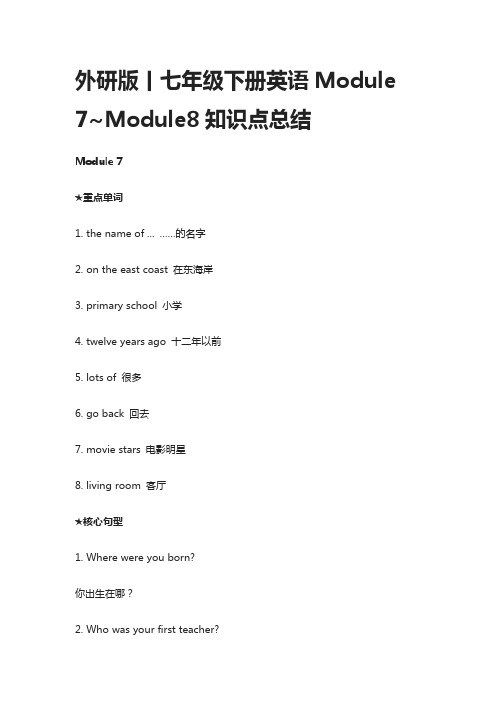
外研版丨七年级下册英语Module 7~Module8知识点总结Module 7★重点单词1. the name of ... ……的名字2. on the east coast 在东海岸3. primary school 小学4. twelve years ago 十二年以前5. lots of 很多6. go back 回去7. movie stars 电影明星8. living room 客厅★核心句型1. Where were you born?你出生在哪?2. Who was your first teacher?谁是你的第一位老师?3. What were they like?他们怎么样?4. There was a garden with lots of trees in it.有一个里面有许多树的花园。
5. It was great to play there.在那里玩耍很棒。
6. I am looking forward to seeing my friends again.我期待再次见到我的朋友们。
7. I was very good.我很守规矩。
★语法点击本模块课文中我们见到了一般过去时态,今天我们先来学习一下be 动词的一般过去式吧。
am 和is 的过去式为was;are 的过去式为were。
构成:1. 肯定句:主语+ was (were) + 表语。
如:I was at school yesterday. 昨天我在学校。
2. 否定句:主语+ was (were) + not + 表语。
如:We weren't at home yesterday. 昨天我们没在家。
He wasn't in the library this morning. 今天早上他没在图书馆。
3. 一般疑问句:Was (Were) + 主语+ 表语?肯定回答:Yes,主语(代词)+ was / were。
- 1、下载文档前请自行甄别文档内容的完整性,平台不提供额外的编辑、内容补充、找答案等附加服务。
- 2、"仅部分预览"的文档,不可在线预览部分如存在完整性等问题,可反馈申请退款(可完整预览的文档不适用该条件!)。
- 3、如文档侵犯您的权益,请联系客服反馈,我们会尽快为您处理(人工客服工作时间:9:00-18:30)。
外研版七年级英语下册第七模块重点句子
1. Where were you born? 你在哪里出生?
2 I was born in… 我出生在……
3 What was the name of the village? 那个村庄叫什么?
4 What was the name of your first school?
你上的第一所学校叫什么名字?
5 Who was your first teacher? 你的第一位老师是谁?
6 She was very friendly. 她非常友好。
7 Who were your first friends? 你最早的朋友是谁呢?
8 He was quite difficult. 他很难管。
9 What were they like? 他们当时是怎样的?
10 What were you like? 你当时是怎样的?
11 There were lots of things to do in Quincy.在昆西有很多事情可以做。
12 I was very happy there.我在那里非常快乐。
13 There was a big living room with a TV, a kitchen, a bathroom and three bedrooms. 我们的房子又大又舒服,有一间大的起居室,里面有一台电视机,还有一间厨房,一个卫生间和三间卧室。
14 On my bedroom walls there were pictures of my favourite movie stars. 在我卧室的墙壁上,贴有我最喜欢的影星的图片。
15 Behind the house, there was a big garden with lots of trees and there was a small lake with fish in it. It was great to play there.
房子后面有一个大花园,花园里有很多树,还有一个小湖里面有鱼。
在那里玩耍真开心。
16 Many of them were my friends. 他们中很多都是我的朋友。
17 I was there for the last time in 2010.
我最近一次住在那里是在2010年。
18 One day I’ll go back, and I’m looking forward to seeing my friends again.将来有一天我还会回去的,我盼望着在见到我的朋友!。
